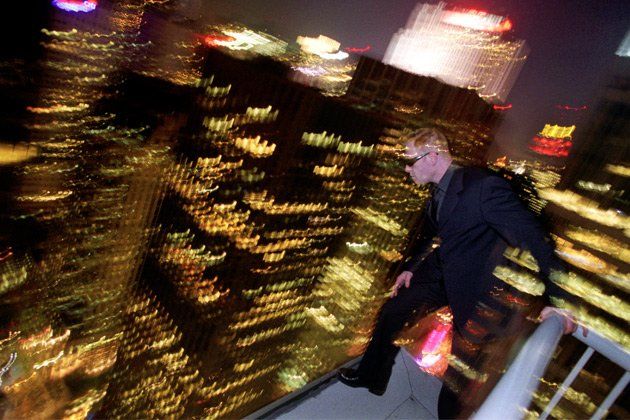
Floors wreathed in steam, a maze of pipes glowing red, uncomfortable temperatures, aged graffiti, china bowls, doors the wrong shape and size. This isn't a grimy version of Wonderland—it's an abandoned building in New York City, and a favorite playground for young-adult "urban explorers," who climb through the building's broken walls and decaying halls as a way to connect with the city.
Urban exploration is not new—dadaists including André Breton, Paul Eluard, Francis Picabia, and Tristan Tzara led secret tours of the abandoned church of Saint-Julien-le-Pauvre in Paris as early as 1921, and lone New Yorkers have been exploring empty subway tunnels for decades. But in the late 1980's and early 1990's, several more organized groups were founded. With names such names as "The Cave Clan," "The Bunker Boyz" and "Diggers of the Underground Planet", these groups were able to share tips, tricks and lexicon on the fledgling internet, forming an urban exploration subculture.
In the '90s, urban exploration was for the hardcore, underground, and extreme. But now, the act of using the city itself—not just its theaters and museums—as a source of entertainment has gained more widespread appeal. In 2001 a Google search of "urban exploring" would get you nothing. In 2010 the term gets more than 6 million hits, and almost every major city has a meet-up group (or two) of its own.
The reasons for the upswing in popularity are varied. The Minneapolis-based Action Squad, one of the first urban exploration teams founded in the United States, posts its motivation on its Web site's general-information page: "indulging your appreciation for history, architecture, and non-standard notions of beauty, chances to appreciate little-seen architecture, going where boring 'normal' people would never even dream of going, and using your wits to avoid detection/arrest (often narrowly)." Brandon Schmittling, a founder of Survive DC, a Washington-based, citywide game of tag, takes a wider view. "Exploring is such a strong urge in human beings," he says. "I think people like to believe there's more out there that hasn't been seen, even if it's just by them."
These days, even those who would never climb a chain-link fence can get in on the fun. In 2001, a group of city lovers calling themselves AntiBoredom started Journey to the End of the Night, a night-long tag game with safe zones and checkpoints spaced throughout the whole spread of San Francisco and New York. Winners are those who make it from one end of the city to the other without getting caught by "chasers." Survive DC has a similar structure, and allows racers to "experience the city a little differently and expand your concept of public space," says Schmittling.
The idea of young adults experiencing the city a little differently isn't isolated to just urban exploration. AntiBoredom now runs alternate-reality games (ARGs) in multiple cities throughout the world, including Flashback, an exploratory alternate-history game funded by the American History and Civics Initiative. (Conspiracy for Good, an ARG about a city-hopping journey to subvert a nefarious corporation, has already drawn on the assistance of J. J. Abrams and Ringo Starr.) Improv Everywhere made long-form street pranks famous in 2001; now the Urban Pranksters network lists 1,401 derivatives of Improv Everywhere in cities around the world, and hundreds more not associated with the New York pranksters.
But why are young adults rushing to claim the city anyway—especially in such playful (and potentially illegal) ways? One suggestion is that they're reacting to the culture of fear that pushed so many boomers—and their young children—into the suburbs in the '70s and '80s. "It gives people a reason to enjoy the outdoors and challenges them to shed their fears about the 'city,' " says Schmittling. "There's also a huge part of it that includes awareness that the city is a public place, that it's not foreign, and that we are allowed to be in it and use it however we want." Oli Mould, an academic from Loughborough University in Leicestershire, England, agrees. "People explore urban areas in order to go beyond what city 'officialdom' prescribes," he says.
Moreover, quite a few of these city lovers claim they're doing what they do to prove a larger point; that even in cities vilified as bastions of hypercapitalism, it's possible to have fun, experience culture, and thrive without earning a huge income. "The capitalist city builds consumerist environments that are intended for people to act in certain ways and in certain places," says Mould. By exploring, he says, "people are expanding the functionality of cities and reclaiming public space." Certainly, a common quality of every urban-exploring troupe, street game, or ARG is that it doesn't cost money to join—or to watch. And it would be against the ethos of an alternate-reality or street game to charge a fee. "It's important that it remains free to take part in, because this is an event that we want to be open to everyone," says Thomas Lotze, one of the co-founders of Survive DC. "If we restricted it just to people who were willing and able to pay, it would change the mission and commoditize it."
The political makeup of these city lovers is what you'd expect; a smattering of liberals, a smattering of libertarians, a disproportionate number of communitarians and anarchists, and a large group who decline to make their politics explicit. But all of them have declared their allegiance to the use of space that the average city dweller only rarely thinks of—and to the challenge, political or not, of reclaiming the city in ways that have more to do with whimsy and wonder than with money and fear.
Uncommon Knowledge
Newsweek is committed to challenging conventional wisdom and finding connections in the search for common ground.
Newsweek is committed to challenging conventional wisdom and finding connections in the search for common ground.
About the writer
To read how Newsweek uses AI as a newsroom tool, Click here.








